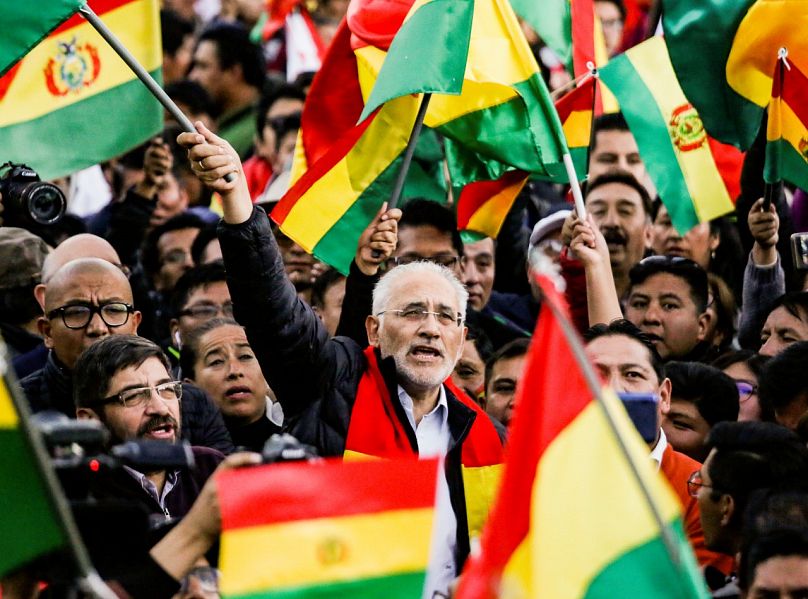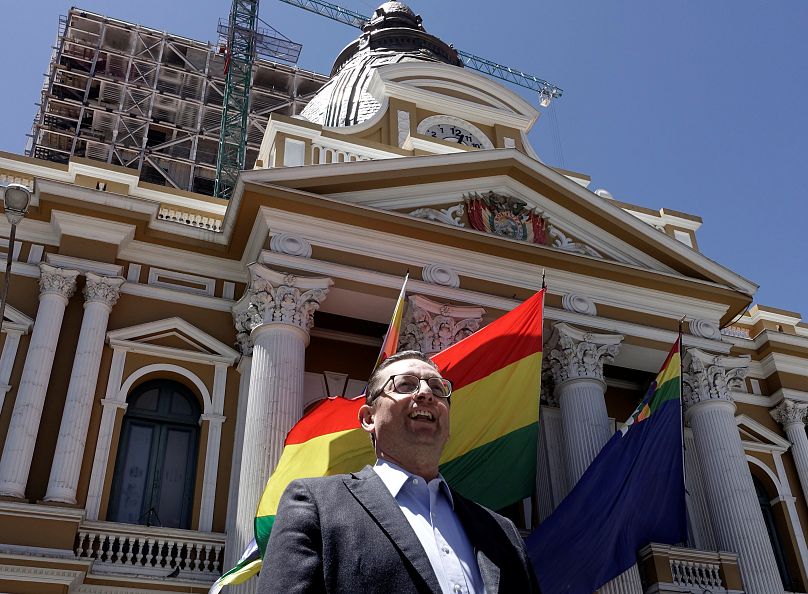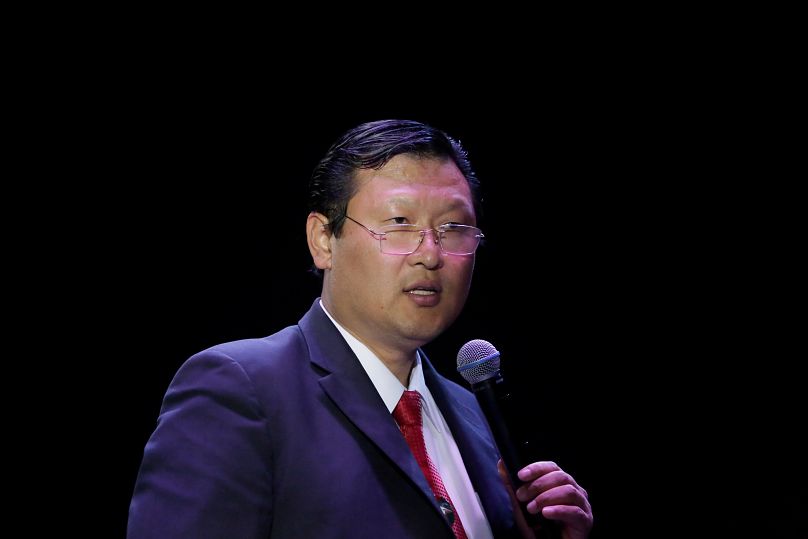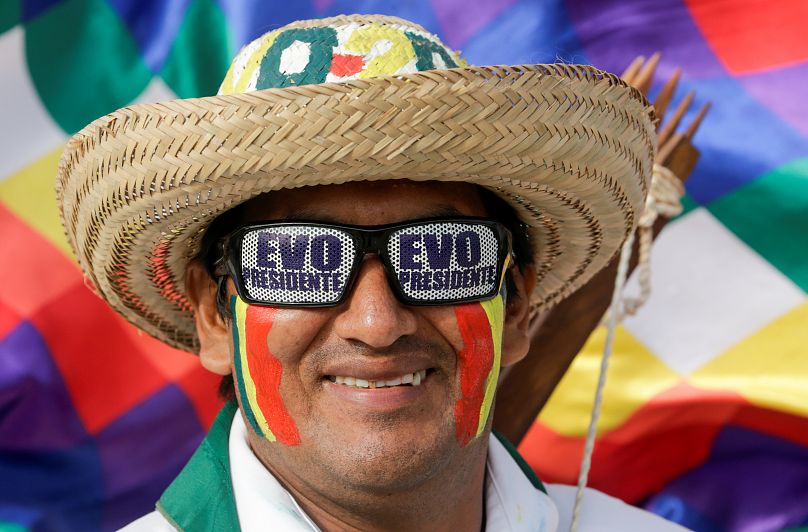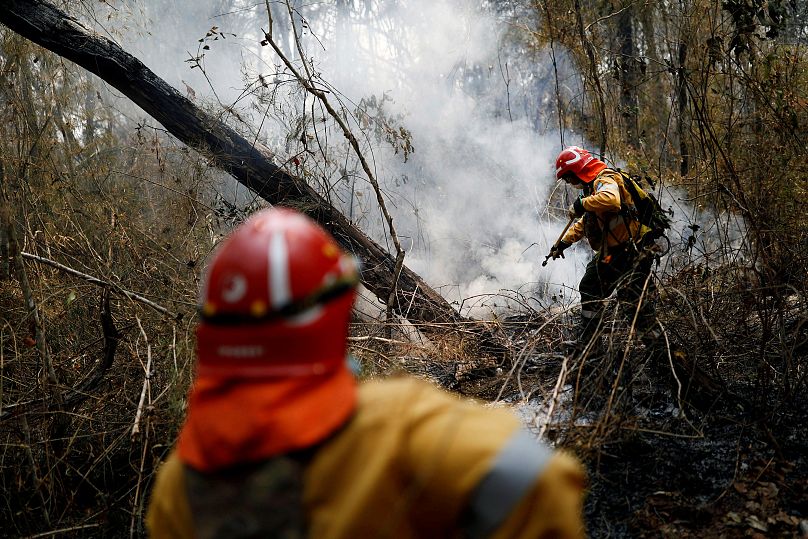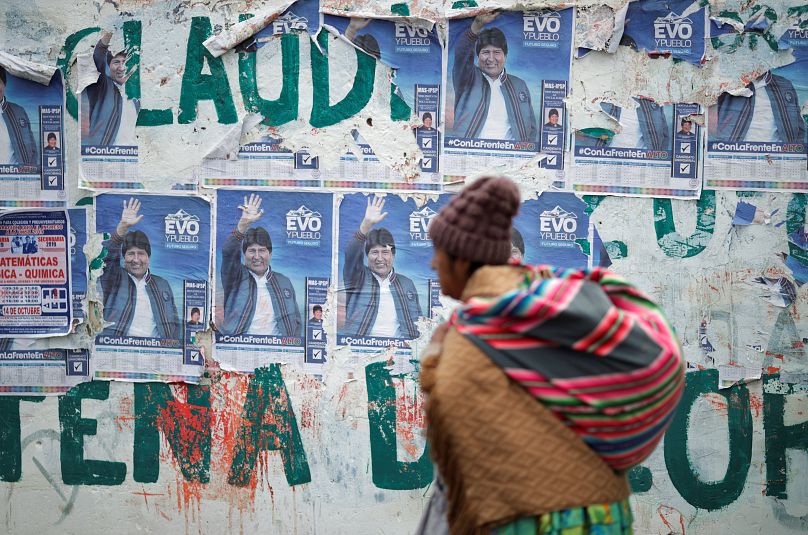Bolivia's elections on Sunday are expected to be the fiercest of the last decade with incumbent Evo Morales likely to be challenged in a second round for the first time since 2006.
Bolivia's elections on Sunday are expected to be the fiercest of the last decade with incumbent Evo Morales likely to be challenged in a second round for the first time since 2006.
 ADVERTISEMENT
ADVERTISEMENT
 ADVERTISEMENT
ADVERTISEMENT
Former president Carlos Mesa has been gaining strength and is seen by many as the most likely to unseat Morales, who, if reelected, would accumulate nearly 20 years in power.
"If Evo Morales wins this election again, he would be opening the doors to a government like Venezuela or Nicaragua," political analyst Iván Arias told Euronews.
How the election works
For a candidate to win in the first round, he must obtain at least 51% of the votes or 40% if the nearest rival is at least 10 percentage points lower. Although the polls indicate Morales will secure reelection in the first round, it is still unclear how many points will separate him from the second opponent.
Who are the opposition candidates?
Carlos Mesa: Morales's main challenger
The candidate for Citizens Community is second in the polls. Now 66, Mesa led the country for under two years between 2003 and 2005 after the 'Gas War' crisis led to the resignation of President Gonzalo Sanchez de Lozada who subsequently fled to the United States.
But intense protests fronted by Morales and little support from Congress also saw him resign.
A renowned historian, writer, and journalist, Mesa also recently represented the country in a maritime dispute with Chile.
His electorate is mostly urban, as well as middle-and-upper class.
Óscar Ortiz: the candidate dividing the opposition
Running for Bolivia Says No and third in the polls, this businessman and current senator accumulates less than 10% of the votes. Although he has no chance of winning, the support he gets will be decisive for a second round between Morales and Mesa.
Many people have called on him to renounce his candidacy, arguing that he only allied himself with the Movement for Socialism (MAS) to fragment the opposition's vote. Ortiz denies these accusations and accuses Mesa of allegedly receiving money to be a candidate for vice president in 2002.
Chi Hyun Chung: Bolivia's ultra-right
This pastor and doctor of Korean origin ranks fourth in the polls and is the novelty in these elections. Despite having recently broken into Bolivian politics with the Christian Democratic Party, he has already managed to entice about 5% of voters.
His proposals are centred on religion and his claims about women and homosexuals have caused controversy.
"The woman has to be educated to behave as a woman," he said in an interview with ATB.
"He is an 'outsider' candidate who has hurt other parties (chances of getting more votes)," Marcelo Arequipa, a political scientist and professor at the Bolivian Catholic University, explained.
The fight for the undecided
According to different surveys, undecided voters make up around 20% of the electorate — a higher-than-usual percentage that could have consequences in the first round.
Several opposition leaders have called to vote for Mesa, including former President Jorge Tuto Quiroga, claiming that it is "the only way to prevent Evo Morales from winning a fourth unconstitutional mandate." Others claim, however, that "voting is legitimising the dictatorship."
"They are begging for the vote," Reynaldo Flores Díaz, a Human Rights defender who does not support any candidate, has said.
What would happen if Evo goes to the second round?
For Arequipa, it is possible that Evo "wins in the first round", but does not have the legislature he wants. He also believes that if there is a second round, Mesa will face an even bigger "enemy".
"Evo Morales has a party structure. He can unite his own electorate, contrary to Carlos Mesa, who would have to negotiate with other actors, something he has not wanted to do," he added. For the specialist, Ortiz's votes would go to Morales while Chi's votes would be mostly void.
But Arias does not agree. He believes that if there is a second round, all opposition forces will join forces — a situation the government wants to avoid.
"He (Morales) has come to control all powers ... People are convinced that there will be fraud," he explained. He also pointed out that society is organising vigils and citizen control mechanisms to protect and defend the vote.
The expert also highlighted that the vote abroad could be decisive if the difference between the first and second candidates is close to 10 percentage points, especially in countries with a lot of Bolivian immigrants such as Argentina.
An illegitimate election?
A large part of the population believes that these choices should not be valid. In 2016, Evo Morales called a referendum to modify the Constitution and authorize a fourth term, although the Constitution only authorises two consecutive ones. The "No" won with more than 51%, however, the Supreme Electoral Tribunal of Bolivia gave the green light to his candidacy stating that he was part of "his human rights".
"He himself said that if he lost the referendum he would go home," says Arias. "There is an illegitimate candidate and legitimate candidates."
However, for Arequipa, the fact that the opposition has decided to participate in these elections gives "legitimacy to the elections."
But for political analyst Arias, these elections were already legitimate because they were planned this year and the opposition only "decided to fight despite everything," because of the political situation in Venezuela.
The key aspects of these elections
Wildfires and the environmental crisis
The heart of South America has been submerged in an environmental crisis in recent months because of the fires that transformed more than four million hectares into ashes and killed more than two million animals.
The fight has not only been against fire, but also against those responsible. The opposition accuses Morales of having approved Supreme Decree 3,973 authorising "controlled burning" and "clearing."
Morales, on the contrary, denounces a war against him. But now that the flames have been extinguished, the next president must deal with the environmental disaster caused in an ecosystem that will take more than 200 years to regenerate.
"I believe that many people are going to punish not only Evo Morales but the entire political apparatus," Reynaldo Flores Díaz said.
The alarming number of femicides and the situation of women
Women's rights and their participation in politics have become some of these elections biggest issues.
Bolivia is the country with the most femicides in South America, the United Nations Economic Commission for Latin America and the Caribbean said in a recent report.
So far this year, 94 women have died at the hands of their current or former partners. It is also one of the Latin American countries in which women suffer most from gender violence. Furthermore, abortion is prohibited in Bolivia yet it has the region's highest rate of teen pregnancies.
The presidential candidates have proposed different initiatives, ranging from prevention policies to arming women to protect themselves.
Is an economic crisis coming?
In Bolivia, economic insecurity and speculation has been growing. The high fiscal deficit, the increase in external debt and the decline in export earnings are not good signs for analysts.
Most of the foreign exchange earnings in the Andean country are due to non-renewable resources, such as hydrocarbons and minerals, and it is now necessary for the country to diversify its economy.
The crisis in some neighbouring countries, such as Argentina, could also have repercussions. This is what Iván Arias believes, saying that at some point someone will have to "pay for the broken plates".
For the specialist, the population must vote for the candidate they consider best prepared to face this crisis looming on the horizon.











